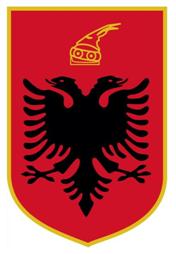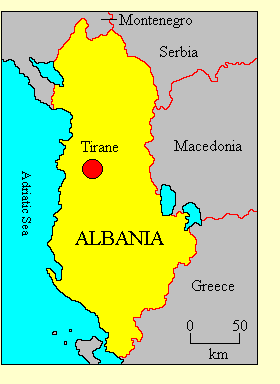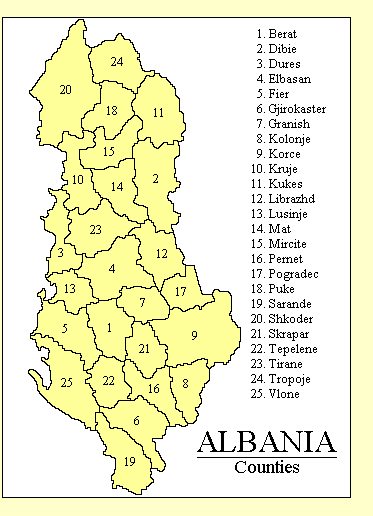

REPUBLIC OF ALBANIA
• Official name: Republika e Shqiperise (Republic of Albania)
•
The Albanians call their country Shqiperia. The Latin name "Albania" comes from an Illyrian people, the Albanoi, who lived in the same area in Roman times.
• Location: South-Eastern Europe
• International organisations: The Council of Europe, The Organisation of Islamic Conference, The North Atlantic Treaty Organization, The Organisation for Security and Co-operation in Europe,
The United Nations, The World Trade Organisation.
• Borders: Greece, Macedonia, Serbia and Montenegro
• Coastline: Adriatic Sea
• Land area: 28,748 Km2
• Population: 3,200,000
• Annual GDP (PPP) per capita: US$6,300 (2009 CIA estimate). World ranking: 105.
• Ethnicity: Albanian 95%, Greek 3%, other 2% (Some estimates of the Greek population are much higher).
• Languages: Albanian is the official language and is spoken by over 90% of the population.
Minorities speak Greek, Romanian, Macedonian and Romani.
• Religion: Sunni Moslem 70%, Orthodox Christian 20%, Catholic Christian 10%.
• Form of government: Parliamentary democratic republic. Albania is divided into 25 counties.
• Capital: Tirane
• Constitution: The Constitution of the Republic of Albania came into effect on 28 November 1998.
• Head of state: The President, chosen by the legislature for a five-year term. The
President's duties are largely ceremonial. President
Bamir Topi took office on 24 July 2007.
• Head of government: The Prime Minister, appointed by the President. The Prime Minister is the leader of the largest party in the legislature and is
accountable to it.

• Legislature: Albania has a unicameral legislature, the Assembly of the Republic of Albania (Kuvendi i Republikes
se Shqiperise). The Assembly has 140 members, elected for four-year terms, by proportional representation from 12 multi-member constituencies.
• Electoral authority: The Central Election Commission administers national elections.
• Freedom House 2011 rating: Political Rights 3, Civil Liberties 3
• Transparency International Corruption Index: 33% (87 of 178 countries rated)
• Reporters Without Borders Press Freedom 2010 Index: 78.5% (80 of 178 countries rated)
• Heritage Foundation Economic Freedom 2010 Index: 64% (70 of 179 countries rated)
Political history
The Albanians were brought under Ottoman rule in the late 15th century, and converted to Islam during the 400 years
of Ottoman rule. For this reason Albania was much less restive in the 19th century than were its Christian
neighbours. Nevertheless the end of Ottoman rule in the Balkans in 1912 brought independence to Albania, and a
German prince, Wilhelm von Wied, was installed as head of state.
On the outbreak of World War I, Wilhelm returned to Germany, and Albania had no effective government
until 1925, when Ahmet Zogu seized power. In 1928 Zogu proclaimed himself to be King Zog I. Zog's comic-opera
reign ended in April 1939 when fascist Italy invaded and annexed Albania. The Germans replaced the Italians in
1943 but withdrew in late 1944. The communist-controlled National Liberation Front then came to
power.
By 1946 the communist leader Enver Hoxha was absolute dictator of the poorest country in Europe. In 1961
he broke relations with the Soviet Union and formed an alliance with China, but this alliance ended in 1978 after
the death of Mao Zedong. Albania was then totally isolated and increasingly bankrupt until Hoxha's death in 1986.
His successor Ramiz Alia tried to reform the system but communist rule collapsed in 1991.

Post-communist Albania was plagued by economic crisis and civil disorder, made worse by weak and
corrupt government and violent conflict between the anti-communist
Democratic Party of Albania, led by Dr Sali Berisha,
and the Socialist Party of Albania, now led by Edi Rama.
Minor parties include the Socialist Movement for Integration (LSI), the Republican Party of Albania and the
Party for Justice and Integration. Since 2005 Albanian politics have become more stable. Albania joined
NATO in 2008. The 2009 election produced a deadlock between the major parties, but this was resolved without violence when the LSI agreed to support Berisha's
government.
Freedom House's 2011 report on Albania says:
"Albania is an electoral democracy. International observers of the 2009 parliamentary elections hailed improvements in a number of areas,
but also cited problems including media bias, abuse of state resources, political pressure on public employees, and flaws in the tabulation
process... While the constitution guarantees freedom of expression, the intermingling of powerful business, political, and media interests
inhibits the development of independent outlets... The constitution provides for freedom of religion, and it is usually upheld in
practice... Freedoms of association and assembly are generally respected... The constitution provides for an independent judiciary, but the
courts are subject to political pressure."
Updated October 2011
|


